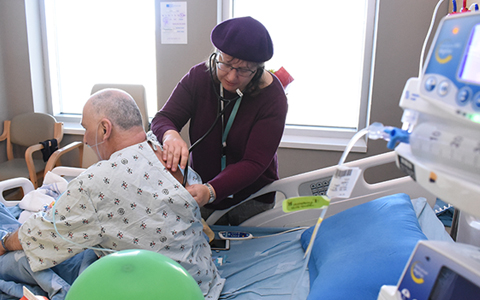
Dr. Donna Zwas, director of Hadassah’s Linda Joy Pollin Cardiovascular Wellness Center for Women, answers questions about the differences in how COVID-19 affects men and women, and its impact on people with heart conditions.
Are there gender differences in how COVID-19 affects women and men?
Reports from all over the world suggest that the number of confirmed cases of COVID-19 is similar in men and women. In nearly every country, however, there are more confirmed deaths from COVID-19 in men. Once men are diagnosed, it appears that they are at higher risk of death.
We don’t know why this is. The virus often enters the body by binding to a protein called ACE2. ACE2 is present in the cells lining the nose, mouth and lungs. Levels of ACE2 are generally higher in men, meaning more cells may be vulnerable to the virus, and this, in turn, may lead to men’s higher risk of severe COVID outcomes and death.
Gender issues may also be a factor. Men are more likely to smoke and drink alcohol, which may contribute to the severity of illness. Men may also seek medical help later than women, which may also adversely affect outcomes.
Is someone with a heart condition more at risk of getting COVID-19 than somebody who doesn’t have a heart condition?
So far, it appears that anyone can be infected, and we have no data suggesting that one group of people is more or less likely to become infected once exposed.
We do not yet know if people with underlying heart conditions might be more likely to show symptoms of the infection or to have a more severe infection than others. So far, most people who get COVID-19 get a mild case, even if they have heart problems. Up to 5 percent may develop pneumonia or more serious illness.
We do recommend extra caution for those who have been diagnosed with a significant heart condition, including heart failure, reduced heart function, reduced oxygen levels in the blood at baseline, or a tendency to develop significant abnormal heart rhythms. Hypertension, diabetes, obesity and advanced age are all risk factors for more serious illness. People who are immuno-suppressed should also consider themselves at high risk.
Can COVID-19 infect my heart?
There is no evidence that the virus infects the valves of the heart (endocarditis). There is also no reason to be concerned that the virus will infect such implanted devices as pacemakers and defibrillators.
When individuals become seriously ill with COVID-19, they have an increased likelihood of developing blood clots in arteries and veins. This may lead to heart attacks, strokes and blood clots in the lungs.
There is also data to suggest that in a percentage of cases, COVID-19 infection can lead to inflammation of the heart. So far, we don’t see evidence that the virus attacks the heart muscle cells but rather that there is inflammation in the tissues surrounding the muscle cells.
If I’m having chest pain, what should I do?
When rates of COVID-19 infection are high, we all try to avoid elective procedures and any situation that may increase exposure to the virus. At the same time, because people are worried about coming to the hospital during the pandemic, they are waiting longer before they seek help. We have seen many heart attack patients who have delayed seeking medical care for so long that, by the time they arrive, they have suffered significant irreversible heart damage. Research shows a 28 percent increase in serious complications that can be attributed to delayed arrival.
Paramedics and hospitals have now developed rapid triage systems that enable the rapid detection of serious heart conditions and that separate suspected COVID-19 patients from other patients.
If you experience chest discomfort, chest pressure or chest pain, shortness of breath, pain in the jaw, shoulders, arms, upper abdomen or upper back, especially if these are accompanied by lightheadedness, sweating, or nausea and vomiting, you may be having a heart attack. Seek medical care immediately.
How does the social isolation of the pandemic affect health in general?
Social isolation and loneliness are associated with a 29 percent increased risk of heart attack and a 32 percent increased risk of stroke. That’s why it is so important to maintain your social network even if remotely. Try to stay in communication with family and friends on a regular basis.
Being in self-quarantine and remaining at home for much of the day makes maintaining heart-healthy habits much more difficult. It’s much harder to eat right and to exercise. Figure out what will help you eat right and help you exercise.









